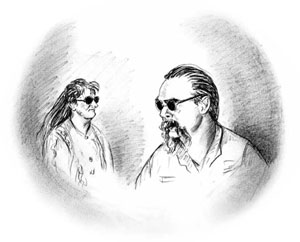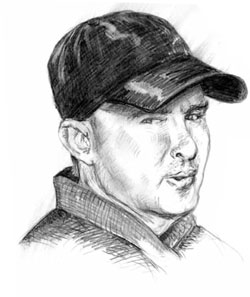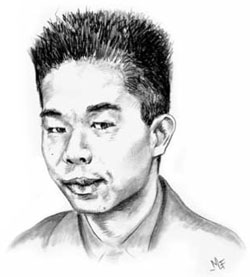Crime Time: Australians Behaving Badly (15 page)
Read Crime Time: Australians Behaving Badly Online
Authors: Sue Bursztynski
Tags: #Children's Books, #Education & Reference, #Law & Crime, #Geography & Cultures, #Explore the World, #Australia & Oceania, #Children's eBooks

HEATHER PARKER – PETER GIBB
H
eather Parker, a prison guard at the Melbourne Remand Centre, wasn’t very popular at work. Actually, she got on better with the prisoners than she did with the other guards – especially one prisoner, Peter Gibb, who was there for armed robbery.
In May 1992, she caused the other prison officers to go on strike after she was caught going into a broom cupboard with her new boyfriend! She was transferred to Pentridge prison and then to a hospital, but she wasn’t popular there either. Finally, she got a desk job.
That was when she started to make plans to help Peter escape. His friend Archie Butterly, another prisoner, would come with him.
Heather planned it carefully. She ordered weapons from the United States. She got all the equipment the prisoners would need for a life on the run and asked a criminal called Alex Thompson to steal her a car and a four-wheel drive. However, she made the mistake of not paying him much for the job. This would cost her a lot more than money later.
On 7 March 1993, Gibb and Butterly used explosives to blow out a prison window. They escaped in one of the stolen cars, with a prison officer called Donald Glasson chasing them in a taxi. Goodness knows what the taxi driver thought when he found himself going after escaped criminals.

Butterly and Gibb crashed the car, then a stolen motorbike. They shot Warren Treloar, a policeman who tried to stop them. Gibb grabbed Treloar’s gun and the prisoners stole the police van. They abandoned the van when they met Heather in her own car. This was another mistake she made – at first, police thought she might have been kidnapped when they checked the number plates, but they weren’t fooled for long.
In Frankston, the trio changed cars again, now using the stolen four-wheel drive. They drove out of Melbourne and stayed at a hotel in a small town called Gaffneys Creek, posing as a couple with a teenage son, who was staying in his room because he was sick. Heather and Peter went down to dinner and had an enjoyable evening with the other hotel guests. It was not a good idea because it meant people could describe them later. Still, they probably would have got away with it if the hotel hadn’t burned down a few hours after they left. That brought the police out.
The police caught Heather and Peter on 13 March 1993. Archie Butterly was dead. Someone had shot him in the head, using Warren Treloar’s gun. There was evidence that Heather might have done it, but she was never convicted of the crime.
During the trial, Alex Thompson said Heather had asked him to steal those cars, complaining about the ‘lousy’ $130 she had paid him.
Meanwhile, Heather sold her story both to the TV program
Sixty Minutes
and
Woman’s Day
magazine. Police had to take the story from the magazine’s offices. Heather was making money from her crime, which was against the law. Not only that, but the TV show and the magazine had made her look like a heroine who had done it all for love!
Her infatuation with Peter Gibb didn’t impress the judge. He sentenced the pair to ten years in prison, but Heather’s sentence was cut to five years and four months.
In 2007, she was in court again. She had attacked a woman whom she thought was competing with her for Peter Gibb’s love. She didn’t go back to jail, and Heather announced that she was considering breaking up with Peter anyway.
So ended the great love story.

DID YOU KNOW…?
In 2006, Queensland con artist Jody Harris was caught in Sydney, when someone recognised her. She pleaded guilty to 43 of 124 charges and was sentenced to four years in prison. Jody had 100 drivers’ licences, various disguise items, a false passport and fake bank and Medicare cards. She is known as the ‘Catch Me if You Can’ thief, after another con artist in America who did similar things.
MATTHEW WALES
THE SOCIETY MURDERS
I
t was a cool evening in early April 2002. In their home in the Melbourne suburb of Glen Iris, Matthew Wales and his wife Maritza were preparing to entertain Matthew’s mother, Margaret, and his stepfather, Paul King. While Maritza played with their two-year-old son, Domenik, Matthew was making dinner and setting the table. He had cooked a delicious vegetable soup.
Matthew, however, had added some ingredients not usually found in soup to Margaret and Paul’s bowls. He had crushed a mixture of painkillers and blood pressure tablets, which he had heard made you sleepy.
Making his mother and stepfather sleepy was important to his plans. One other thing he had prepared was a piece of wood, which he had hidden in the front garden.
Dinner went well, though later Maritza said she had noticed that her husband’s parents seemed a bit tired and her mother-in-law spoke in a strange way. However, she thought that perhaps Margaret had just drunk too much wine. Maritza did the dishes and took her little boy up to bed.
Matthew walked outside with his mother and her husband. There, he grabbed his piece of wood and bashed both of them, hard, on the head. When they were lying on the ground, he checked to see if they were breathing. They weren’t. He checked his mother’s pulse, then his stepfather’s. As far as he could tell, they were dead, as planned. When Maritza came downstairs, he told her what he had done, begging her not to tell on him.

Maritza was horrified. She pleaded with him to contact the police. When he wouldn’t, she agreed not to call them, though she was unhappy. Maritza believed she should be loyal to her husband, whatever he had done. She was also afraid that Domenik would lose his father.
Matthew drove the car to Middle Park, where he left it. He hid the bodies in the garden under a pile of rubbish including a child’s wading pool, and the next morning he hired a trailer and the equipment he needed to bury them. On Saturday, he drove to Marysville, a place 100 kilometres outside Melbourne, and buried the couple in a shallow grave.
By Sunday, the other members of Matthew’s family were wondering what had happened to Margaret and Paul. Margaret was supposed to have lunch with Matthew’s sister. She was never late and always told her family where she was. On Monday, the family told police that their parents were missing. Matthew said he had waved them goodbye on Thursday and had no idea where they were. Unhappily, Maritza supported him.
Unfortunately for Matthew, he made a lot of mistakes. He had tried to clean up, but police still found blood. He paid for everything with a credit card, which made it easier for police to work out what he had bought – and why. He thought he was burying the bodies in a lonely spot, but it was a popular camping place.
On 29 April, park rangers in Marysville found the bodies and soon afterwards Maritza told the police what she knew. Matthew was arrested and put on trial. Maritza was at first charged with being a part of the crime, but the charge was reduced to a two-year suspended sentence, since it was clear that she had known nothing about it. She had only lied to cover for him, slowing down the investigation of the crime.
Matthew admitted to his crime, but refused to accept that he had done anything wrong. He said that his mother had dominated his life and used money to control him. That wasn’t what his brothers and sisters thought. Matthew had been the youngest child, only seven when his parents divorced, and had been spoiled rotten, they said.
The murders became known as the Society Murders because the victims were wealthy.
Matthew was convicted and sentenced to 30 years in prison.

DID YOU KNOW…?
Mary Wade wasn’t Kevin Rudd’s only convict ancestor. In 2008, the Prime Minister was presented with a book that showed he had other convict ancestors. Thomas Rudd was transported to Australia in the nineteenth century for stealing a bag of sugar and married Mary Cable, who had stolen a bolt of cloth. One ancestor stole glue, while another female ancestor was transported in 1798 for forging coins. Perhaps Mr Rudd sometimes wishes he had her around when money is short…
SEF GONZALES
I
f your school marks were bad, you’d probably promise your parents to study harder and do better next time.
Sef Gonzales decided it was simpler just to kill his family before they found out.
Born in the Philippines, Sef came to Australia with his family in 1991, when he was eleven. His father Teddy, a lawyer, set up a business in Sydney. He and his wife Loiva worked hard and did well. They loved their two children, Sef and his sister Clodine, and wanted them to succeed in life. Sef was rather spoiled. He had money and designer clothes and, when he was old enough, his own car.
Sef was a strange boy, who could be violent. He also had an active imagination. He told his school friends that he had a recording contract, that he had cancer, that he had been shot at by a sniper. He also said that he was training for the Olympics, that he had a black belt in tae kwon do and even that he had a TV production company – anything his active imagination could come up with!
Sef’s parents hoped he could become a doctor, but when he finished school, his marks weren’t good enough. They persuaded him to do a special course which would let him study medicine later, but Sef failed again. After that, he did some subjects that would let him study law if he passed. But Sef was lazy. By 2001, it was looking as if he was going to fail that, too. He had to do something, before his family saw the letter with the bad news.
He would poison his mother, to start with. Sef didn’t just slip something into her tea. He did his research, finding websites that told him what would work well, and ordered some poisonous castor oil seeds. Then he wrote anonymous letters to a food and drink company, saying their products had been poisoned so that they would take them off supermarket shelves. He hoped that the story would get into the newspapers and then, when his mother died, people would draw the wrong conclusion.
When the newspapers didn’t report the story, he decided to go ahead with the murder anyway. His mother did become very ill, but she survived. Doctors didn’t know why she had been sick. Disgusted, Sef threw out the seeds.
He’d just have to do this the hard way. Sef chose 10 July as the date for his mass murder. He gave himself an alibi by arranging to meet a friend for dinner. By the time he met his friend, the Gonzales family was already dead. They were all stabbed and Clodine was also hit with a baseball bat. Just to make it look good, he wrote a race hate message on the family room wall, signed KKK.
When he came home, he screamed that his family was dead and called in neighbours and the police, claiming that he’d seen someone running away.
At first, people felt sorry for the poor boy who had lost his family, but the police were never happy with his story. It didn’t make sense. For one thing, the bodies had been dead too long to believe that someone had hung around long enough to be seen by Sef. And why had they used knives from the kitchen to commit the murder? Also, the paint used for the message matched some paint kept in the garage.

But it was going to take time to gather enough evidence against Sef, and he was allowed to go free for the time being.
His relatives didn’t believe his story either, not even his grandparents, who left for Melbourne. If they supported him, it was from a long way off!
Beginning to realise that he still might be caught, Sef tried desperately to fix up his alibi, but only made it worse. The evidence against him mounted up. Sef was arrested in June 2002, nearly a year after the murder, and sentenced to three life terms in prison.
The spoilt rich boy was never going to enjoy life again.
